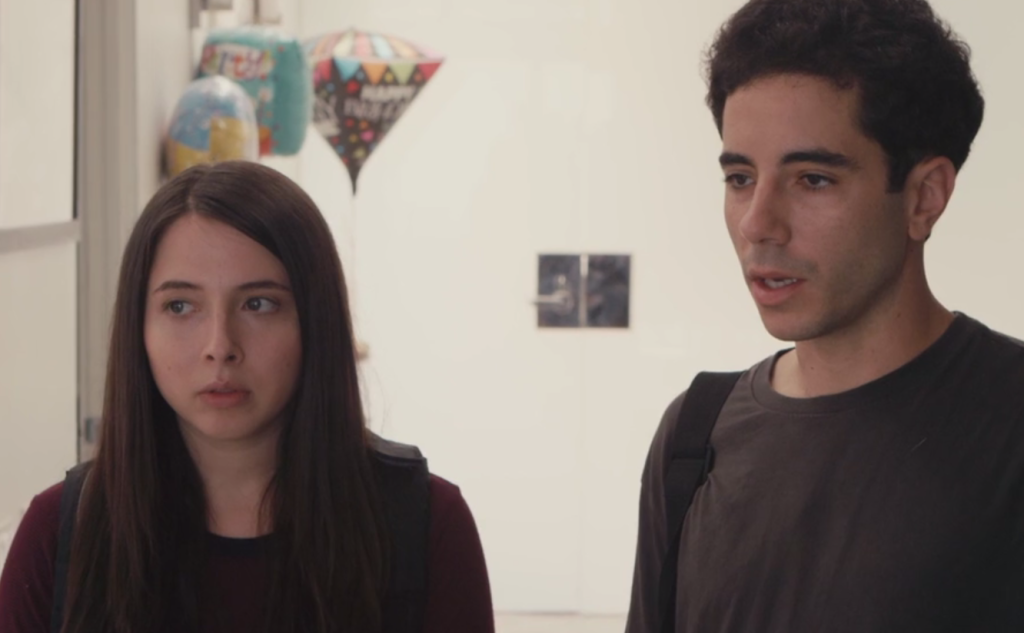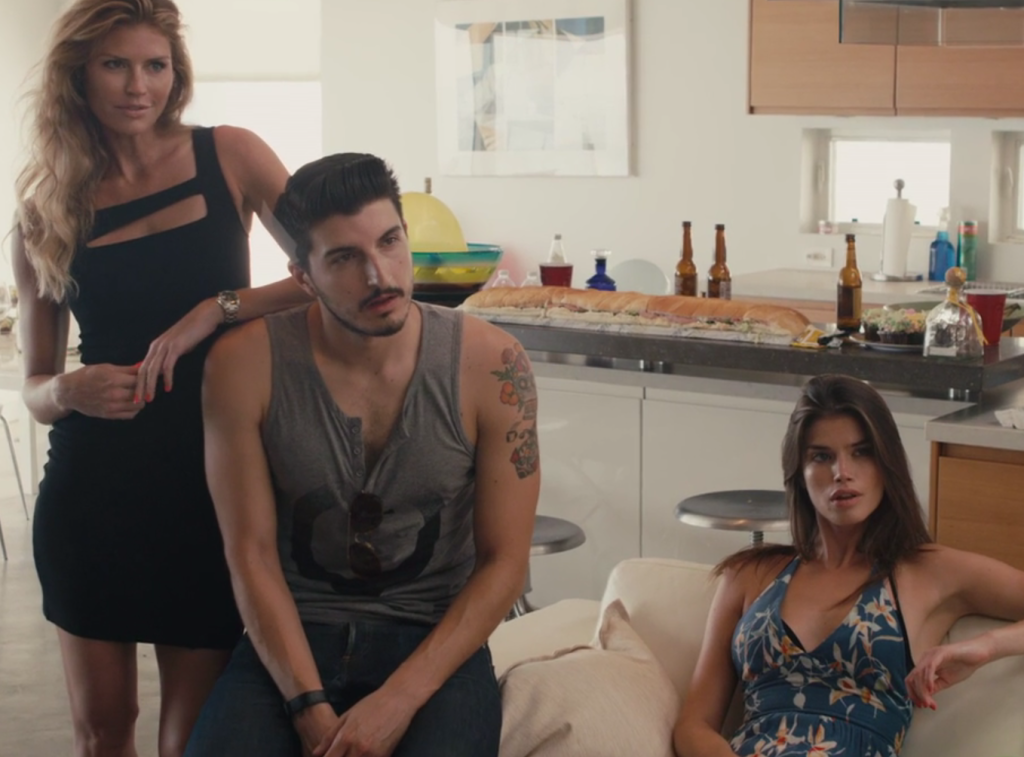Genre: TV pilot – Half-Hour Single-Camera Comedy
Premise: Follows the adventures of two Los Angeles 6’s trying to make it in a land of 9s and 10s.
About: Today’s TV pilot was picked up by the newly branded “Freeform” Channel, which has gone all in on the millennial demographic. Creators Benji Aflalo and Esther Povitsky shot a pilot episode on their own, which got the attention of Andy Samberg’s Lonely Island crew, who came on as producers.
Writers: Benji Aflalo & Esther Povitsky & Eben Russell
Details: 35 pages
The conundrum with television pilots is that television is long-form storytelling. And long-form storytelling works best with lower-concept material. Shows like Friends, Law & Order, Modern Family… there’s no big concept to any of these shows. It’s just characters and a barely-there initial hook (“They’re friends in New York!”).
While this used to be enough, a new problem has arisen: insane competition. If you come to the plate with a low-concept TV idea these days, there’s a good chance your show will get buried. This has resulted in what I call the “high-concept low-concept” TV idea. It’s characters getting into situations, just like the shows I listed above, but inside bigger and more specific worlds. Veep – the White House. Silicon Valley – tech startups. But even that’s not enough anymore. So TV is going the way of features – scrambling for big IP (Rosemary’s Baby! Training Day! Comic Book shows!).
How, then, did Alone Together rise above all this? I’ll answer that in a second. But first, let’s check out what Alone Together is about.
Benji and Esther are the 20-something runts of LA. Don’t worry. That’s not a harsh analysis. They’d agree with it. And therein lies their struggle. They’re two bottom-rung barely attractive actors trying to stand out in a town full of the most beautiful people in the world.
Whereas Esther is a Midwest transplant who can barely afford her rent, Benji’s parents have “Fuck you” money, the problem being that the main person they say ‘fuck you’ to is Benji whenever he asks for any of it. This leaves Benji living in perpetual irony – he’s got a room in a beautiful house in Malibu, but can’t afford gas to get there.
When Benji’s brother and sister hold a huge party at the house, it’s an opportunity for Esther to expand her social circle and finally get that boyfriend she’s been angling for. While she fails miserably at that plan, Benji catches the eye of a hot party-goer when she learns he lives here.
When Esther suspects that Benji’s new girlfriend is an escort, she’s forced to sign up as an escort herself on the service to confirm her suspicion. Soon, men are hitting her up for dates, and while she’s initially grossed out, she starts to like the idea of getting wined and dined, and agrees to a date with an older gentleman. Naturally, both of our heroes’ situations implode, leaving them back at square one, a square they’re starting to believe they’ll never escape.
Like I said earlier, these super-low concept shows are a dime a dozen on the script circuit. And because there’s no concept, everything boils down to how inventive the comedic situations are and how witty the dialogue is. And it’s not like it’s impossible to stand out in these areas. But when that’s all your show has to offer, you’re handicapping the shit out of yourself.
With that said, there’s some pretty funny stuff in Alone Together. In this exchange, Benji attacks Esther for going out with an old dude from the escort site…
BENJI: I hope you figure that out when that guy kidnaps you and locks you in a basement forever.
ESTHER: Whatever. Free rent.
BENJI: You could literally get your head cut off!
ESTHER: Warren’s not cutting anyone’s head off! Not with his rheumatoid arthritis.
Or when Benji’s asshole older brother points out to his two model girlfriends that Benji and Esther are a lot older than they look…
MODEL GIRLFRIEND 1: You’re like twelve. Why are you worried about aging?
DEAN: Actually, they’re both pushing thirty.
BENJI: I look young because I spend most of my time alone and don’t have to make a lot of facial expressions.
Even the character descriptions are funny. Here’s Benji’s: “BENJI, pathetic but confident.” I love character descriptions that are to the point. Too many writers try and stuff a biography into their character intros. Keep it simple.
With that said, this is still a basic comedy about two people living in a city trying to make it. It’s universal but devoid of a sexy hook. How, then, was it able to leap frog all the clones? One. Simple. Answer.
THEY WENT OUT AND F*&KING SHOT IT THEMSELVES.
Shooting anything is hard. So when you have a tangible product to show people? That’s a thousand times more valuable than a script. When a producer sees that, they know what they’re getting if they give you money to make a show. That same producer might have three other funnier scripts on his desk. But those are just pieces of paper. What may come of them is a mystery. This is tangible proof that you know how to make a show.
And I’m not saying this is the only way to get your pilot noticed. What I’m saying is, we all start with the same number of chips. But you can do things to raise your pile. You can come up with a high concept. That famously happened with True Detective.
You could shoot something professional, like these guys did. Or shoot something barely professional that still shows how funny your talent is, which is what the Broad City gals did, posting shoddily-produced vignettes on Youtube.
If you don’t have access to production equipment, think of something else. Come up with a teaser, get somebody to draw concept art. Remember, this is the ENTERTAINMENT BUSINESS. They want a show. Give it to them. That’s part of your job.
Now, what’s interesting about these guys shooting their own pilot and the changes they’ve made to the script is that the produced pilot is better. Not by a lot. They’re both funny. But you could tell that once they had more money, they were trying to build a bigger story. We had the big party scene and a date restaurant scene.
In the produced pilot, all the locations were rooms or easy-to-shoot exteriors. There were never more than 4 characters in a scene. It forced the writers to be more creative. For example, instead of a big party at the Malibu house, Benji and Esther show up after the party is over and bring their out-of-their-league crushes to the place hoping to get laid, and the crushes end up with each other instead.
It’s a classic example of how bigger doesn’t always equal better.
Still, I liked both versions of the show. These two actors are funny. And the big lesson here is if you want something – such as having a show on television – you gotta fight for it. Nobody gives out participation trophies in Hollywood. Do everything in your power to show that you’re serious.
[ ] What the hell did I just read?
[ ] wasn’t for me
[x] worth the read
[ ] impressive
[ ] genius
What I learned: Comedy’s all about placing your characters in situations then asking, “What’s the worst thing I can do to them right now?” In the produced pilot, Benji and Esther just spent all their money on one of those ridiculously expensive LA juice cleanses so they can look like rail-thin movie stars. They’re going to hole up in Benji’s house for the weekend and only drink juice. So… what’s the worst thing you can do to your characters in this situation? They get there at the tail end of their brother’s party and there’s copious amounts of food everywhere. Fried chicken. Cupcakes. Pies. Waffles. Donuts. The one temptation that can ruin their juice cleanse is staring them right in the face.



